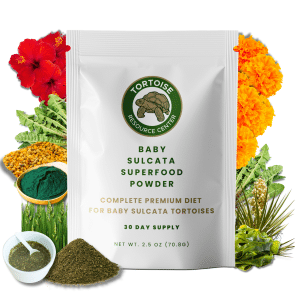Tortoises are very prone to conjunctivitis, or the swelling of the eyelids. Many cases of conjunctivitis are caused by bacterial infections and need prompt diagnosis and treatment to get better.
In this article, I cover the most common tortoise eye infection symptoms, what causes these infections in the first place, and the steps you should take to return your pet tortoise to full health.
Recognizing the Symptoms of Eye Infections
Tortoises can experience a range of eye-related health issues. While some of these issues are caused by deficiencies (namely, Vitamin A) or physical trauma, infections caused by bacteria or viruses are also quite common.
Some, but not necessarily all, of the most common symptoms of eye infections in tortoises include:
- Excess tears
- Discharge
- Redness
- Swelling
Behaviors related to eye infections include:
- Holding one or both eyes closed
- Rubbing the affected eye(s)
Eye infections usually affect one eye more than the other (especially early in the course of the infection). Symptoms that appear in both eyes simultaneously may indicate a whole-body issue like a cold. However, only a veterinarian can confirm the source of the discomfort.
Secondary Symptoms
An eye infection that isn’t caught early can spread to other parts of the body. It’s also possible for an underlying health condition to affect the eyes, even if that isn’t where the issue started.
Keep an eye out for these additional symptoms that could affect a tortoise with an eye infection:
- Lethargy (i.e., lack of energy)
- Poor appetite
- Nose or mouth discharge
- Labored breathing (secondary respiratory infections)
Causes of Eye Infections in Tortoises
Many (but not all) eye infections stem from an improper environment. Double-check the temperature and humidity of your tortoise enclosure. When these levels are off, it can affect your tortoise’s ability to fight off infections. Bacteria and viruses also need certain environmental conditions to thrive, so monitoring things like temperature and humidity can prevent potential infections before they start.
Eye infections can also be the result of an unclean enclosure. While your tortoise’s habitat may look clean to the human eye, soiled substrate or bits of old food can provide a breeding ground for bacteria. A clean environment is far less likely to harbor disease.
Bacterial and Viral Causes
Nearly all eye infections are caused by bacterial or viral pathogens. Again, these pathogens tend to spread most in hot, humid environments.
Tortoises wander and graze, and tend to use their heads to push things that are in their way. Because of this, their eyes are more likely to come into direct contact with infected surfaces. (To put things in perspective, you or I would need to touch an infected surface and then shortly after rub or touch our eye for the same effect.)
Both viral and bacterial eye infections can spread from one tortoise to another. This is an obvious problem if you have more than one tortoise—especially if they share an enclosure. However, infections can also spread on tools, substrates, and even your own hands and clothing. The same is true of any “used” supplies you may get your hands on.
New tortoises can also introduce viral or bacterial infections to your home. I recommend quarantining new tortoises until you’re sure they are free of disease.
Treatment Options
If your tortoise shows signs of an eye infection, I recommend trying to find the source of the infection. It’s possible that your tortoise has just run into a bit of bad luck—we all get sick every once in a while. But if that infection was caused by something like high humidity or dirty substrate, you want to address the root issue sooner rather than later! If you have multiple tortoises, monitor the others for early signs of infection as well.
Your tortoise will likely need medication to address the eye infection itself. For that, you should make an appointment with a veterinarian.
Veterinary Care
A veterinary check-up will confirm whether or not your tortoise’s symptoms are caused by an infection or are the result of physical trauma (e.g., a scratch or debris in the eye). A reptile-savvy vet can also help determine the cause of the infection and provide advice on how to prevent future issues.
Once your vet diagnoses your tortoise with an eye infection, they will likely prescribe an eye drop or ointment. If the infection is bacterial, then antibiotics will quickly kill off the bacteria and clear the infection. Viral infections may take longer to clear up.
Are You Starving Your Tortoise?
Save 10% on premium tortoise food and supplements from Tortoise Resource Center on Amazon now using code BUYNOWGET10

Sulcata Vitamin & Mineral Topper Supplement
30-Day Supply | 2 oz (56 g)
$24.99

Baby Sulcata Tortoise Superfood Powder
30-Day Supply | 2.5 oz (70.8 g) Bag
$24.99
Preventing Eye Infections
The best way to prevent future eye infections is to maintain a clean, safe environment and prioritize routine health checkups. By following these simple steps, you’ll greatly reduce the risk of eye infection and other common tortoise health concerns.
Habitat Maintenance
Invest in a good thermometer and hygrometer (humidity meter) to monitor your tortoise’s habitat. Remove items that could scratch your tortoise’s eyes if bumped against them.
Ideally, you should remove soiled substrate on a daily basis and replace the substrate in your tortoise’s habitat weekly.
Regular Health Checks
Tortoises are hardy creatures and can hide symptoms of disease for a surprisingly long time. Scheduling regular vet appointments is a great way to monitor your tortoise’s health and catch infections early.
I understand that not everyone has easy access to a vet experienced with reptiles. While physical exams are necessary to catch many issues, video calls can also be a great way to consult with a veterinarian in non-emergencies.
When to Seek Immediate Veterinary Help
While health concerns should always be addressed by a professional sooner rather than later, eye infections are rarely an emergency. If you notice any of the following signs, however, I recommend contacting an emergency vet immediately:
- Your tortoise has stopped eating and drinking and shows signs of dehydration
- Your tortoise is breathing slowly or is it taking labored breaths
- Your tortoise has stopped going to the bathroom
If you found this article helpful, you may also like ‘Causes of Tortoise Mouth Rot‘.
Citations
- The Tortoise Table Signs of a Healthy Tortoise
- All Pets Veterinary Hospital Tortoise Care Sheet


